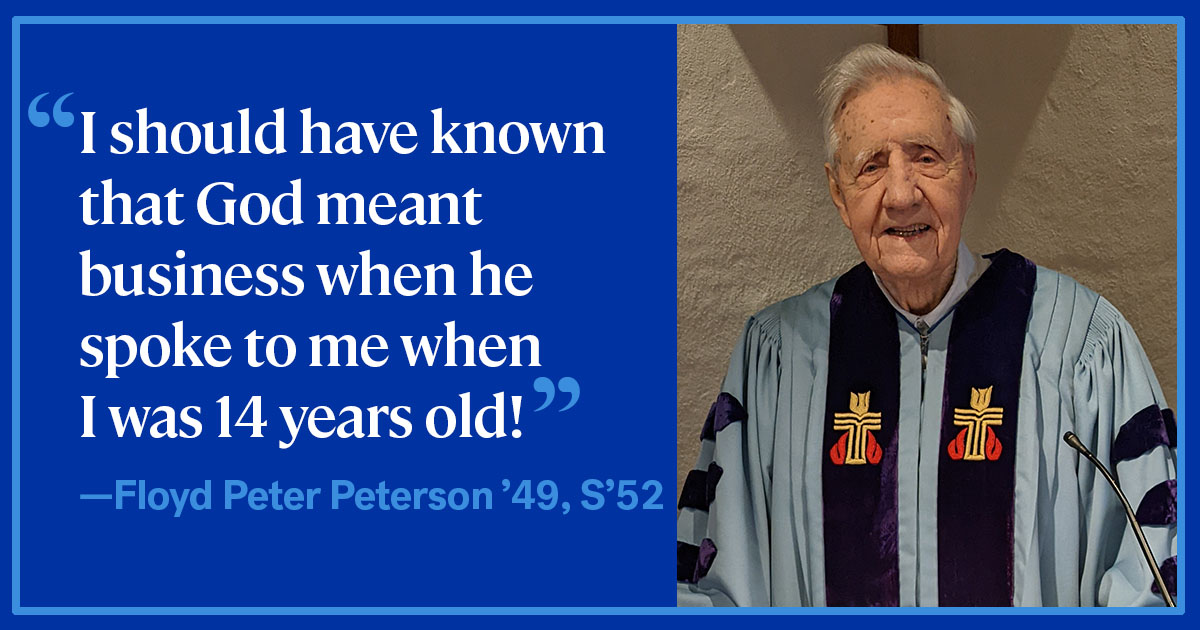
Your Story
An alum reflects
Called by God
Floyd Peter “Pete” Peterson was born in 1926 and reared on a farm near Daggett, Michigan. After the tragic deaths of his older brother and father, Pete ran the family farm for two years while completing high school. Every Sunday, Pete would drive his mother to Daggett Moravian Church, but he refused to attend services with her. “I was mad at God,” he says. “I couldn’t believe that the God she believed in would allow all these terrible things to happen."
By Sara Peterson ’71 and her father-in-law, Floyd Peter Peterson ’49, S’52
“One Sunday when I was outside waiting for her, something strange happened,” Pete continues. “I felt a warm, contented feeling sweep over me. I felt I was loved deeply by God! I heard an inner voice as clearly as any spoken word. It said, ‘You are mine. You will serve me.’ I knew what I was going to have to do with my life. I have heard that same voice several times since that day. It has always told me the truth about what was happening and what I needed to do. One of the last times I heard it, I was told, ‘You will live a long and very productive life.’ That was a surprise—all my male ancestors had died rather young, and that was what I expected. I had no idea how long and how productive my life would be!”
Pete completed high school with honors in 1943 and was eager to leave the farm and find a job in Kenosha, Wisconsin, where he had relatives. “Graduation was on Friday, and on Saturday I was on a train going south,” says Pete. A year later, while assembling engines for Navy Corsair airplanes at Nash Motors Company, Pete learned that one of his best friends had been killed in action in the South Pacific. To avenge his friend, Pete enlisted in the army, requesting service as a paratrooper in the South Pacific. “I got none of what I asked for, but I found out later I got what was the best for me.” He was deployed to Europe and assigned to the 232nd regiment of the 42nd infantry division, known as the Rainbow Division. “War is not a good experience, no matter what the movies try to make of it. I saw a lot of terrible things happen to a lot of good men.”
As the war wound down, Pete was assigned to battalion headquarters because he could type. “After things settled down a bit, division headquarters put together what they called ‘Rainbow University.’ As a lark, I applied and was accepted. I took three courses: psychology, German, and geology. I made perfect grades in every one of them! Later I found out that this was very important. God has a way of looking after the blockheads who don’t know how to look after themselves.”
After leaving the army with the rank of regimental sergeant major in August 1946, Pete immediately applied for admission to Moravian College. “The admissions committee looked at my high school transcript with straight A’s but also looked at the kind of courses I had taken—home economics, wood shop, automobile mechanics, and typing—and rejected my application. As an afterthought, I mailed in the record of the college courses I had taken in Austria.” After reviewing Pete’s Rainbow University transcript, the committee reversed its decision. Pete’s rejection letter was already in the mail outbox, and Raymond Haupert, Moravian’s president, ran to retrieve it. “Had I received that letter of rejection,” Pete says, “I would have been back in the army.” “The next few years were a kind of haze of overwork, struggle, and exhaustion,” Pete recalls. He reconnected with Marjorie Antes, his girlfriend before the war. She agreed to leave Kenosha and come to Bethlehem once Pete worked out how they could be together.
“There had always been a strict prohibition against theological students being married. I was the first one to break that tradition. We were married in the Emmaus Moravian Church in late October 1946. Dr. Haupert was not at all pleased; he gave me a lecture about doing that after the special effort they had made to get me admitted. However, they didn’t kick me out as they might have done in previous years. [Dr. Haupert] said they had to make exceptions for men who came back from the war.” Indeed, returning GIs changed the culture of the college. “The upperclassmen tried to make me wear a dink!” Pete laughs, then adds, “I didn’t have time for that college-boy stuff.”
To become a pastor in the Moravian Church, Pete needed both a bachelor of arts and a bachelor of divinity degree. Usually that course of study takes seven years. Pete completed both degrees in a little over five years, earning his bachelor of divinity degree by 1952. He made dean’s list every semester, worked part-time for a moving company, and helped raise a family. “It didn’t take long for our first child to be on the way,” says Pete. “Cheryl Ann was born in July 1947.”
Immediately after completing his BA, Pete was called by the Moravian Church to establish a new congregation outside Easton. In 1949, he began his seminary studies while simultaneously founding Palmer Township Moravian Church, which he served until 1962. He subsequently served Moravian congregations in California, Maryland, and Florida. Now a pastor in the Presbyterian Church, Pete is still preaching every Sunday at age 95. “I should have known that God meant business when he spoke to me when I was 14 years old!”
